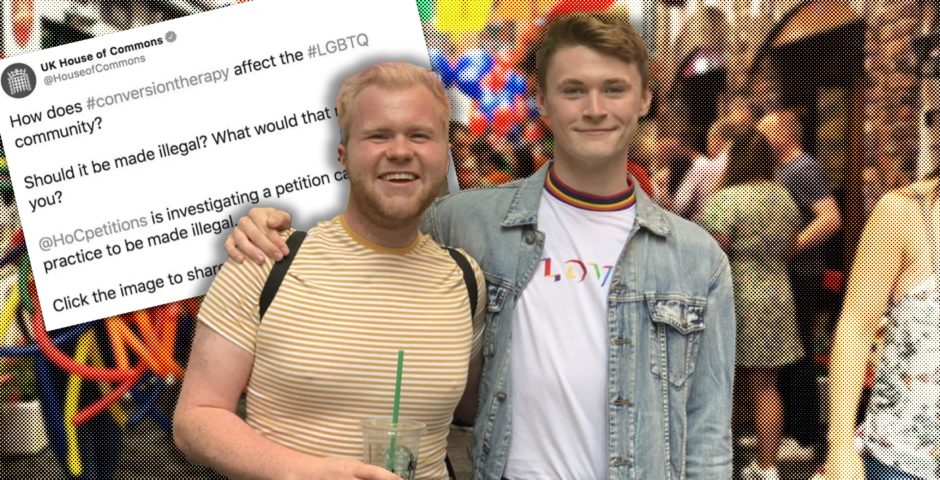
Conversion therapy might be banned on Instagram, but it’s still legal in the UK
We haven’t come as far as you’d think
In 2018, a study conducted by the Ozanne Foundation revealed 68.7 per cent of all participants in so-called “conversion therapy” had suicidal thoughts after the process. That same year, the British government announced all conversion therapy practices would be banned in the UK. Except, it’s 2020 and conversion therapy is still legal in this country. It’s still happening.
On Friday last week, the government announced via a tweet they would be “investigating” a petition to make conversion therapy illegal, preceding the news were a series of questions: “How does conversion therapy affect the LGBTQ community? Should it be made illegal? What would it mean to you?”
You’d be forgiven for looking at a tweet like that and thinking “uhm, excuse me?” Like, I’m sure it’s standard for the government to open up a discussion before making legislation, but come on. The “affects” (if we’re putting it lightly) of conversion therapy on the LGBTQ community are not only blindingly, painfully obvious, they’re also excruciatingly well-documented. The tweet was quickly called out for being insensitive and later deleted, but it was a glaring indicator we have a long way to go. Framing conversion therapy as a “gotta see both sides” debate isn’t just offensive, it’s dangerous. Here’s why:
What is conversion therapy and is the government seriously only now dealing with it?
Conversion therapy is an abusive and in some cases physically and psychologically torturous way of forcing someone to abandon their Queer identity. These can exist through more subtle forms such a retreat camps, but through forced viewing of hardcore porn, electro-therapy and in some abhorrent cases, corrective rape.
The practice isn’t offered through the NHS but through external organisations, like the Core Issues Trust, a Northern Ireland registered charity who in their mission claim to support those suffering from ‘sexual brokenness, including homosexuality’. It’s difficult to understand how these groups can be supportive environments for vulnerable people questioning their sexuality, when they are being referred to as ‘broken’.
The government has spoken about conversion therapy before. Theresa May and former Equalities Minister, Penny Mordaunt committed have described it as “the worst kind of abuse, which must be stamped out.”
The renewed calls for the ban on conversion therapy stem from a petition which has so far accrued over 200,000 signatures. As mentioned earlier, the government is set to have a consultation on the practice soon, but whether such consultations will even bear fruit is questionable. A similar consultation on the Gender Recognition Act was unceremoniously scrapped this year.
How does conversion therapy harm Queer people?
Let’s go back to that Ozanne Foundation study. 59.8 per cent of those surveyed suffered from anxiety or depression which required medication following conversion therapy. Considering Queer people are already disadvantaged, with separate research noting the LGBTQ+ community are more likely than heterosexuals to have mental health difficulties in the first place, this is seriously alarming. Victims (and they are victims) have said they experience intense flashbacks to the therapy throughout their adult life.

Just because Same-Sex Marriage has been legalised, it doesn’t mean you can stop fighting for Queer liberation
Earlier today, it was announced Instagram would be blocking any content which promoted conversion therapy. The NHS and all major UK therapy professional bodies are united in agreement that the practice needs to be banned ASAP and signed a memorandum to that effect. Siobhán O’Neill, Professor of Mental Health at Ulster University, told The Tab: “Conversion therapy is unethical, and completely unnecessary because homosexuality and same-sex attraction are not mental illnesses. The evidence shows that these therapies are harmful and damaging to mental health.”
What do LGBTQ students actually think about the consultation?
Toni, an International Relations graduate and openly gay woman believes the UK should work with other countries to abolish conversion therapy, such as Sweden or Australia. She told The Tab: “The mere existence of conversion therapy, let alone the fact it is actually conducted, is a huge slap in the face to the LGBTQ+ community which fails to uphold LGBTQ+ human rights.”
Newcastle University student Ryan says: “Being LBGT+ is not a choice. The fact this remains legal in the U.K. is nothing short of a human rights violation. As a nation who boasts about egalitarianism, the government should hang their heads in shame.”
Salford TV and Radio Production student Charles told The Tab conversion therapy is “just the cruelest thing you can do to a human”.
“Conversion therapy does not and will never work, it simply scares people into lying to themselves,” he added.
Second year Greenwich student, Josh says the debate should not even require platforming and that the government should seek more stringent regulation to ensure special interest groups do not harm LGBTQ+ members. “By allowing this to continue it gives ammunition to homophobic groups that being gay is something that’s a ‘choice’,” he said. “This discriminatory and oppressive narrative must be tamed.”
It feels weird in 2020 to see something as obviously barbaric and fucked-up as conversion therapy be debated like this. More than anything it’s patronising to have to explain how it effects the LGBTQ community, but here we are. We’re past the point of public consultation and stupid tweets, we need immediate policy reform.
Related stories recommended by this writer:
•
•
•





















